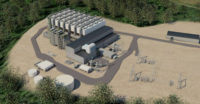A dispute between a Dallas power plant developer and utility over “trade secrets” used to build a 525-MW power plant in Utah has finally reached a David-and-Goliath conclusion after nearly 12 years of litigation.
A state supreme court has upheld on appeal a $134-million judgment for the startup developer against the utility now owned by conglomerate Berkshire Hathaway for breaching a confidentiality pact in a power plant deal they were negotiating and using the intelligence to build a rival project instead. The move upended the developer’s project plans and “destroyed” the company, says its attorney, who confirms that the judgement has been paid.
USA Power claimed in a 2005 suit that Oregon utility PacifiCorp breached a confidentiality agreement and misappropriated the concept and preliminary design for its air-cooled, natural gas-fired power plant, as well as financial information not publicly disclosed. USA Power did not patent the design of the Spring Canyon plant to be built in Mona, Utah.
PacifiCorp, through its Utah-based unit Rocky Mountain Power, ended talks with USA Power, and developed on its own what became the Currant Creek power plant in Mona. It went on line in 2005, designed and built by The Shaw Group, now part of CB&I, for about $343 million.The firms are not named in the litigation.
“We disagree with the allegations, but we will respect the rule of law and abide by the court ruling,” says Paul Murphy, a Rocky Mountain Power spokesman. Berkshire Hathaway acquired its parent Pacificorp in 2006. A firm attorney did not return a request for comment.
The May 18 decision sends a simple message, says an attorney for USA Power, which dissolved several years ago with the unexpected death of its founder, who was not identified. “If you steal a trade secret you can be in big trouble,” says James Magleby of Salt Lake City-based Magleby Cataxinos & Greenwood, which specializes in intellectual property cases. He says trade secret claims can allow plaintiffs to recover, in addition to direct losses, profits a defendant made from stealing the secrets. Magleby says USA Power could not use its design elsewhere because it was specific to the Utah site.
While trade secrets claims now are brought in state courts, President Obama last month created a federal legal route with his signing of the Defend Trade Secrets Act of 2016.
An east coast power plant developer who asked to remain anonymous said the theft of ideas in the energy industry is common and difficult to protect against. “But the federal law and the size of the award in the PacifiCorp case will make utilities think twice before doing it,” he says. Magleby says the case will hopefully show “that size and money are sometimes not enough to protect a wrongdoer.”
USA Power disclosed proprietary information to PacifiCorp when the two were negotiating the sale of the Spring Canyon project. After ending negotiations , the utilty issued a request for proposals to meet its power needs. The company received four proposals from USA Power, but decided to build a plant itself, using the developer’s trade secrets. “If you have a good idea, you shouldn’t share it without reasonable precautions to maintain its secrecy,” Magleby says.
A Utah jury in 2012 had to decide whether PacifiCorp’s engineers could have “reverse engineered” proprietary information in the preliminary design USA Power disclosed to the utility during negotiations. PacifiCorp had argued that Shaw Group permissibly reverse-engineered confidential back-up studies from public information in permit applications.
But in the current ruling, Chief Justice Matthew Durrant agreed with USA Power that the jury would conclude that Shaw Group could not reverse-engineer all of USA Power‘s confidential studies, particularly “economic analyses, financing information, potential business partners, and specific business plans,” he said.
Durrant also said that by “willfully and maliciously” misappropriating USA Power’s confidential information, including the price to beat, Pacificorp undercut the firm.
He upheld the 2012 jury award to USA Power of $21 million in actual losses and more than $112 million in damages for the utility’s “unjust enrichment” from the non-disclosed information. “Trade secret law is designed to create a disincentive to the theft,” Magleby says.






Post a comment to this article
Report Abusive Comment